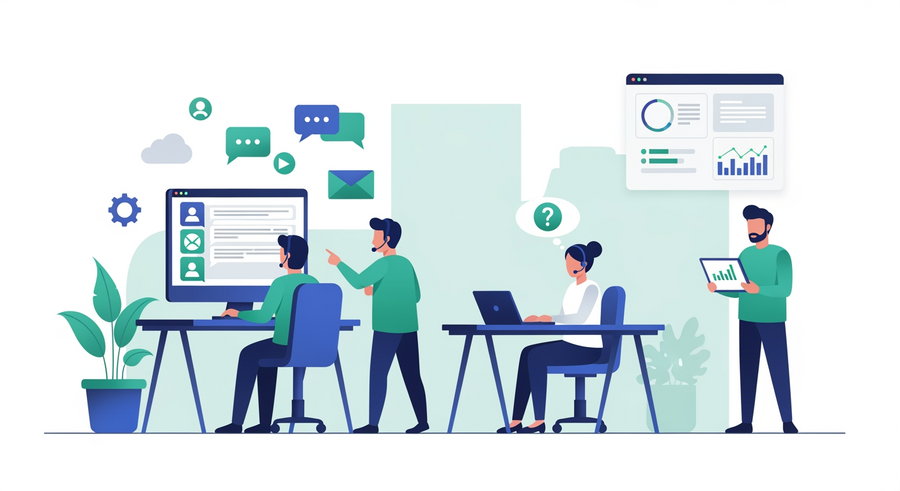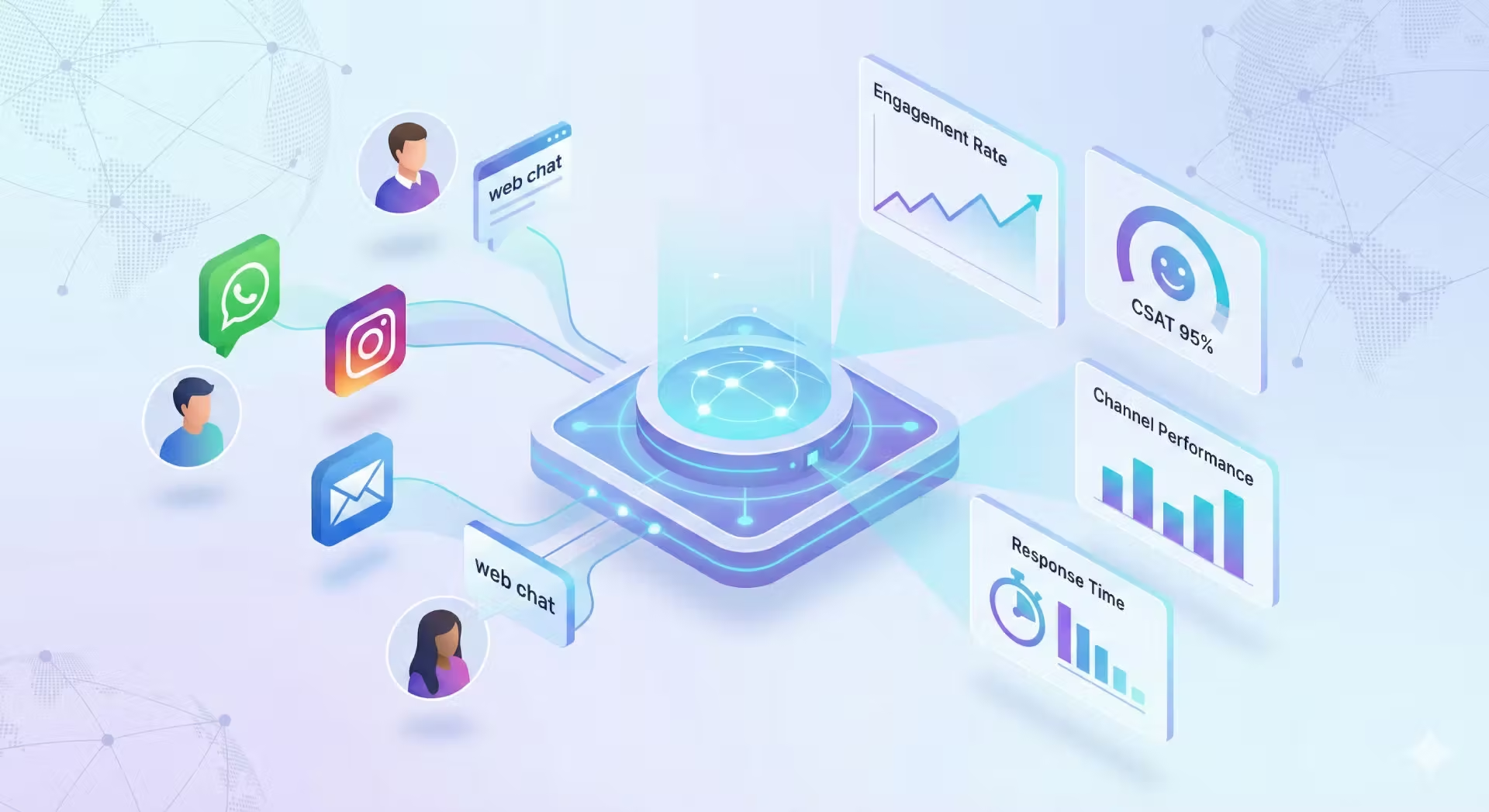Businesses need to maintain a consistent customer journey across all platforms. Because when you don't? People will move onto a business that can offer that.
With technological advancement, companies now have the advantage of using an omnichannel AI approach to easily maintain tasks like supply chain, customer support, and content creation.
But is it worth it to use an omnichannel AI platform? Let’s uncover the answer in this blog post.
What is Omnichannel service?
According to Wiser Notify, almost 73% of modern customers use different methods to buy. These include online, in-store, and by using their mobile phones to check out different products.
Omnichannel service is about creating a seamless customer experience across all your digital channels and the physical world. So, your customers feel the same vibe in both your digital and the brick-and-mortar store.
Keep in mind that omnichannel is different from multichannel service. In multichannel we try to sell customers in both mediums, online and offline. However, in omnichannel we focus more on creating a seamless experience across all platforms.
In one line, the omnichannel strategy is maintaining a customer journey on different channels.
How AI is creating an impact in omnichannel service?
Companies that use an omnichannel strategy see an average of 9.5% annual increase in revenue as opposed to 3.4% for companies that do not use an omnichannel approach.
As a service team, you can leverage omnichannel AI to personalise and optimise the entire customer experience regardless of the medium and channel. AI can analyse the data and customer responses to create insights about marketing campaigns, predict customer behaviour, and handle repetitive tasks.
You can utilise every AI technology like natural language generation, machine learning, NLP, and computer vision. These can help you enhance customer experience from offering personalised recommendations to customer service and providing a seamless shopping experience.
If you want to utilise the maximum use of AI in your marketing then ensure that you blend it perfectly with the human effort. As AI can only provide data and prediction, you are the one responsible for using the provided information in the best way possible.
Generative AI and omnichannel marketing
The advancement in generative AI technology is also creating an impact on the omnichannel approach. Here are the key points on how to use generative AI in omnichannel:
- Automation of content creation: Generative AI can automate the creation of content, freeing up your team to focus on the bigger picture. This automation helps maintain consistency in brand messaging across multiple platforms—both online and offline.
- Enhanced customer journey experience: By using generative AI, marketers can build omnichannel strategies that emphasise the entire customer journey rather than focusing on specific channels. This ensures that customers receive a unified experience whether they interact with the brand in-store, online, or via mobile.
- Consistent brand messaging: With generative AI, businesses can maintain a consistent tone and brand voice across various channels. Whether a customer is engaging with the brand through email, social media, or physical stores, the messaging remains aligned with the brand identity.
- Personalisation at scale: AI omnichannel can personalise content for customers at scale. By analyzing customer data, AI can deliver personalised recommendations and experiences, ensuring that each interaction feels unique, regardless of the touchpoint.
- Improved customer data insights: Generative AI can analyse vast amounts of customer data to identify patterns in behaviour. These insights help refine omnichannel strategies by enabling more targeted and effective campaigns that align with specific customer preferences.
- Seamless campaign execution: Generative AI allows marketers to create and run marketing campaigns automatically across different channels, ensuring smooth execution and more efficient use of resources. This reduces the risk of disjointed messaging across channels.
This approach makes omnichannel service more efficient, delivering a cohesive customer experience across all touchpoints.
How is AI changing omnichannel service?
AI has a positive impact on the business industry. The following 10 examples will help you understand the power of AI omnichannel strategies.
1. Creating a personalised customer experience
Brands are using AI to precisely understand customer needs, buying preferences, and journeys. Businesses normally use data like product preferences, geographical locations, content viewed, transaction histories, and even the preferred communication channel to create hyper-tailored experiences for their customers.
2. Personalised offers and price optimisation
AI is also making it easier for brands to find the right price for their products. You can use the technology to find user channel preferences, purchase history, and price sensitivity.
3. Better IT infrastructure
To deliver exceptional omnichannel experiences, brands must have a flexible and scalable IT infrastructure. AI-driven insights are helping leaders redesign their systems to better respond to customer preferences and support growth. From supplier onboarding to fulfilment, every aspect of the supply chain needs to be aligned with customer needs.
4. Digitising supply chain
A solid supply chain is important for your omnichannel business as it can help you accelerate your performance and handle all the incoming requests. Brands that utilise this approach are using AI consistently to digitise supply chains and enable on-time performance.
5. Creating propensity models for personalised service
AI models are helping businesses create propensity models that can predict customer behaviour based on their past actions and preferences. These models bring invaluable information that you can use to create tailored marketing campaigns including bundling offers and pricing strategies.
6. Virtual Try-on
The omnichannel AI approach is now taking digital shopping to another level. Now the combination of machine learning and AI is creating apps that allow users to virtually try outfits from the comfort of their home. The app can even act as a sales agent and help customers reach a final decision and then recommend an online or in-store purchase.
7. Improving order track-and-traceability with AI
Another benefit of AI in omnichannel is tracking orders and their traceability across all platforms. The use of technology can quickly track orders, allocate them, and highlight out-of-stock issues. It is useful because when you outsource a complex task to technology it gets cheaper, easier, and efficient.
8. Improving customer service with AI omnichannel
Customer service is one of the important aspects of omnichannel. If your business is unable to provide real-time and valuable communication then there are chances that your strategies might fail. So to solve the issue you can use generative AI in your online stores to ensure 24/7 assistance for your customers. You can use chatbots like Trengo’s AI HelpMate to handle the situation.
9. Improving marketing and sales effectiveness
The relevant use of AI and machine learning in marketing can help businesses to scale up at a faster pace. AI can help you identify trends and behaviours of customers. You can then use the information to run ads, push in-demand products, and stay in front of your audience in a personalised way.
10. Utilising predictive content analytics
AI and machine learning-powered predictive content analytics are increasing sales closing rates by identifying the kind of information that will influence a buyer to make a purchase. Finding out which material has to be tailored and when to deliver it can be done with machine learning to analyse past prospects and buyer behaviour.
Best ways to use AI recommendations in an omnichannel strategy
There are many ways to utilise AI in your service strategy. Some of the ideas can include:
Automate welcome email series
These are emails you send to your audience based on their initial interactions with your brand. It can be a sign-up for your newsletter or an event registration. These emails can help you build a personalised relationship with your customers as you will provide them with helpful information. You can use AI to handle this repetitive task.
You can use AI to write, deliver, analyse, and tweak your email drip campaigns.
SMS marketing campaigns
You can go one step ahead and use SMS marketing along with emails. You can send personalised offers, event promotions, or special discounts directly to your prospect’s mobile phones. This can help you build customer trust and loyalty.
Increasing customer lifetime value with personalisation
You can use AI to recommend personalised products or services according to past activities of your customers like engagement and conversations with your AI bot. It will help you increase the customer's lifetime value and even get new customers through referrals.
Future prediction in AI omnichannel service
How would you feel if you got the power to predict the future behaviour of your customers?
It will be great, right?
AI can help you achieve that power. The technology can start reading the patterns and actions of your customers and create reports that will help you improve your decision-making and take your business to another level. Your plans will get better as you will be utilising the data and not running campaigns solely based on luck.
Good AI platforms can help you with the following aspects of customer behaviour and your marketing campaigns.
- Get real-time insights into customer behaviour: Advanced AI and machine learning algorithms can accurately understand and predict customer actions.
- Campaign efficiency optimisation: When you have the right insights you will be able to create relevant plans and hit the right pain points to achieve the goals.
- Optimise revenue: When your targeting is right, you will be able to generate more revenue easily.
- Omnichannel utilisation: You can use the customer reports to change or maintain all of your platforms according to the customer's need.
- Predefined templates: When you have the insights you can then use the data with generative AI and create templates for repetitive tasks like welcome email series.
Contextual personalisation using AI
When it comes to service and commerce, the A/B test is the go-to testing strategy. In this testing, we put two alternative strategies into action and wait for one of them to succeed. It is a good approach, but is still, generic.
If 70% of your prospects convert using strategy A and you decide to use it, what about the remaining 30%? Is it a good idea to get rid of strategy B that they resonated with?
So, how are you going to solve this issue? The use of AI can help you reach the maximum audience at a more personalised level. The AI technology can use the previous actions of the prospects as a context and share with them the most personalised variant of your campaign.
This method will allow you to grow at a larger scale because of personalization. So, using AI in your campaigns is now a better option as compared with the old-school A/B testing.
Content creation using AI
Content creation is a creative process and sometimes it can demand more time to brainstorm ideas than actually implementing them. However, things have changed with the improvement in AI technologies like ChatGPT.
GPT is a great tool as it can help you brainstorm ideas, reevaluate them, and put them into action at a faster pace.
ChatGPT can help you with many different tasks including market research, idea generation, and copywriting. It may not have been useful in the past with a limited knowledge bank and inaccessibility to the latest data, but modern AI tools, like ChatGPT 4o, are more powerful and can help you take your content creation process to another level.
For example, you can use the power of AI to plan, write, edit, and evaluate:
- Blogs
- Social media posts
- Email campaigns
- Landing pages
- Video scripts
- Product descriptions
- Personalised recommendations
For example. Here is a prompt for ChatGPT to write a hyper-focused landing page for a project management software:

The future of AI in Omnichannel chatbots
You need a good chatbot for your business as it can help you maintain a consistent brand tone that you like to use on all platforms. The personalised and consistent help for your customers will allow them to trust your business. So, you should ensure that you use the AI omnichannel customer communications and win your prospect’s trust.
Are you ready to make your omnichannel business successful? Let’s start with the best AI omnichannel tools like the Trengo HelpMate.




.png)











